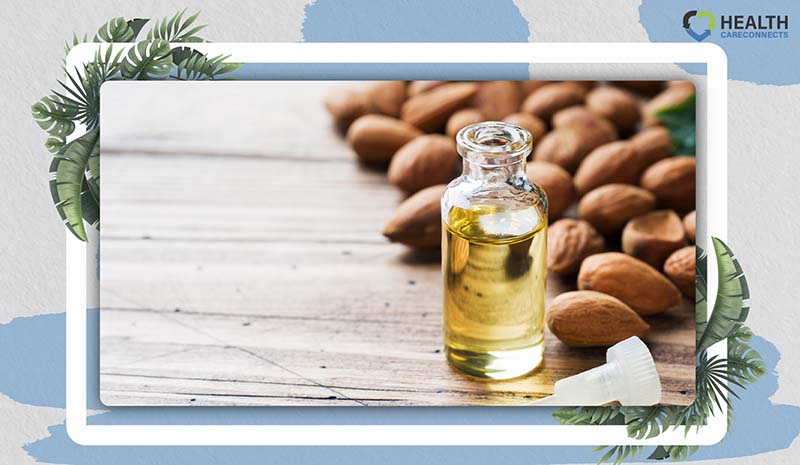You’re likely familiar with the idea of using olive oil or coconut oil to hydrate your hair, but have you ever explored the wonders of almond oil? Is almond oil good for your hair?
This often overlooked natural oil is packed with vitamins that promote scalp and hair health. Its luxurious, emollient qualities not only condition but also add a brilliant shine to your locks.
Moreover, the versatility of almond oil allows for various applications, from deeply moisturizing masks to flyaway tamer.
Is Almond Oil Good for Hair Growth?
Absolutely, almond oil is indeed beneficial for your hair, particularly for moisturizing and smoothing purposes.
Derived from the fruits of almonds (Prunus amygdalus), which are native to regions like the Middle East and South America, almond oil is a treasure trove of nourishing components. While scientific research on its benefits is somewhat limited, dermatology nurse practitioner Jodi LoGerfo, DNP, highlights that almond oil contains essential fatty acids such as oleic, linoleic, and palmitic acids, along with being rich in vitamin E. Certified trichologist Kerry E.
Yates further reinforces its efficacy, noting that almond oil serves as a natural antioxidant that safeguards your hair and scalp, while its blend of vitamins, minerals, and fatty acids works wonders in conditioning both your hair and skin.

Tips for Using Almond Oil for Hair Growth
Almond Oil Head Massage:
- Massaging your scalp with almond oil is an excellent way to combat hair loss and stimulate hair growth.
- Aim to massage your scalp twice a week for optimal results.
- Before massaging, warm the almond oil to lukewarm temperature.
- Prior to applying the oil, make sure to detangle your hair.
- Begin by gently massaging the oil into your scalp, then distribute it along the length of your hair.
- Allow the oil to sit for 3 to 4 hours before washing it out.
Almond Oil Hair Mask:
- Methi seeds are known for their ability to prevent dandruff and promote hair health. When combined with banana, they create a mask that nourishes and adds shine to your hair.
- Blend methi seeds and banana together to create a smooth paste.
- Add a tablespoon of honey and a teaspoon of almond oil to the mixture and blend until smooth.
- Apply the mask to your scalp and hair, then leave it on for 15 to 20 minutes before rinsing with lukewarm water.
Almond Oil Serum:
- An almond oil serum can provide added weight to your hair, making it appear fuller and healthier. Combining almond oil with aloe vera and lavender further enhances its benefits and helps prevent hair loss.
- Mix three drops of lavender oil, two tablespoons of aloe vera gel, and one teaspoon of almond oil together.
- Apply the serum to the length of your hair while it is still damp, focusing on the ends.

Benefits of Almond Oil for Hair
Here are some of the benefits of almond oil for hair:
Enhances Hair Health
- Almond oil is a nourishing oil rich in vitamins like B7 and E, which contain biotin, essential for strong and healthy hair.
- The antioxidants from vitamin E combat damage caused by free radicals, pollution, chemicals, and heat, improving hair texture and strength against dryness and brittleness.
- Regular application of almond oil repairs the hair structure from the roots, promoting overall hair health.
Makes Your Hair Softer
- Almond oil is an emollient, containing essential fatty acids that moisturize both the scalp and strands, resulting in soft, smooth hair.
- Its penetrative properties reach the cellular level, softening hair at the roots and calming frizzy textures when used consistently.
Addresses Scalp Conditions
- Almond oil’s antibacterial properties make it effective for scalp treatment, particularly for conditions like dandruff.
- It helps balance out fungus and yeast responsible for dandruff while loosening dead skin cells to facilitate easy removal, thus aiding in alleviating flakiness.
Stimulates Hair Growth
- Massaging almond oil onto the head and scalp improves blood circulation to the roots, promoting hair growth and strength.
- The presence of biotin in almond oil can reactivate dormant follicles, encouraging the production of keratin to thicken and grow thinning hair, thus stimulating hair growth.
Who Should Use Almond Oil for Hair?
Almond oil is best suited for individuals with dry, normal, or combination hair types, although those with oily scalp or hair can still benefit from its use when applied sparingly from the mid-shaft to the ends rather than directly on the scalp.
According to celebrity hairstylist Orlando Pita, sweet almond oil is especially beneficial for those with dehydrated, dry, damaged, or frizzy hair. Its hydrating properties effectively combat dryness, tame frizz, and impart a luxurious shine, making it an excellent choice for improving the overall health and appearance of your hair.
Risks When Using Almond Oil
While sweet almond oil is generally considered safe for use on hair and skin, there are a few considerations to keep in mind:
- Tree Nut Allergies: Individuals with tree nut allergies should avoid using almond oil, as it may trigger an allergic reaction.
- Acne-Prone Skin: Those with acne-prone skin, especially if other oils have caused breakouts, may want to avoid applying almond oil directly to the face. There’s a risk that it could clog pores and exacerbate acne.
- Eye Area: While almond oil can offer benefits for eyelashes and eyebrows, it’s crucial to ensure that any product used near the eyes is safe and free of contaminants to prevent irritation or other adverse reactions.
Conclusion
In conclusion, incorporating almond oil into your hair care routine to enhance strength and shine poses low risk for most individuals and is often effective. While scientific studies on the specific conditioning and strengthening effects of almond oil are limited, its active nutrients and properties have demonstrated the ability to improve hair texture, leaving it stronger, softer, and shinier.
Moreover, almond oil is renowned for its gentle nature on the scalp and leaves a pleasant scent after application. While further research could provide deeper insights into its mechanisms of action, the anecdotal evidence and longstanding use of almond oil in hair care underscore its potential as a valuable addition to your beauty regimen. Is almond oil good for your hair? The evidence points to yes, making it a worthwhile consideration for anyone looking to enhance their hair’s health.
For those seeking more information and honest product reviews, I recommend visiting HealthCareConnect. Explore firsthand experiences from users and gain valuable insights to help inform your decision.

Dr. Joyce Slater: Your Guide to Informed Health Choices
Dr. Joyce Slater shines as a distinguished expert in the field of nutrition and public health. Contributing her vast expertise to HealthConnectbc, she embodies a deep-seated passion for enhancing public well-being. As a respected figure in her field. Dr. Slater’s academic journey and professional achievements are nothing short of inspirational.
Holding a significant position as a researcher and educator, Dr. Slater has delved deeply into the intricacies of food literacy and nutritional science. Her work, prominently featured in numerous esteemed scientific publications, underscores her dedication to expanding our understanding of food’s role in health and society.
At the heart of Dr. Slater’s professional ethos is a profound desire to positively impact individual lives through education and research. She often says, “Empowering people with the knowledge to make healthier choices is the most rewarding aspect of my work.” This principle is the cornerstone of her involvement with HealthConnectbc, where she strives to provide reliable and practical health advice.
Dr. Slater’s contributions to HealthConnectbc are multifaceted: academically, she offers insights into the complex world of nutrition and health, enhancing both public understanding and professional practices. Additionally, she is instrumental in guiding and inspiring the next generation of health professionals, thus fostering future excellence in the field.
Juggling rigorous research with her educational duties, Dr. Slater demonstrates an unwavering commitment to her profession. Her approachable nature and genuine concern transcend the confines of academia, touching the lives of everyone she interacts with. Dr. Slater looks forward to continuing her journey of discovery and education, dedicated to the ongoing improvement of public health and nutrition.
At HealthConnectbc, Dr. J. Slater is not just a contributor; she is a guiding light, dedicated to enlightening and motivating individuals towards a healthier and more informed lifestyle.
PUBLISHED ARTICLES
- Food literacy competencies: A conceptual framework for youth transitioning to adulthood (2018)
- Self-perceived eating habits and food skills of Canadians (2016)
- Challenges to acquiring and utilizing food literacy: Perceptions of young Canadian adults (2016)
- Socio-demographic and geographic analysis of overweight and obesity in Canadian adults (2009)
- Sustainable well-being: Concepts, issues, and educational practices (2014)


